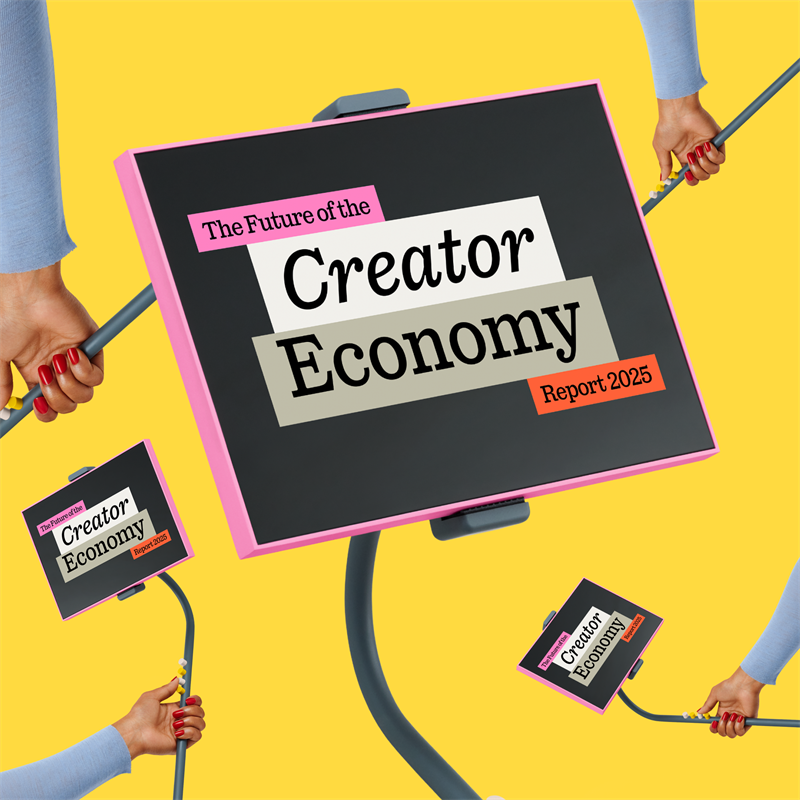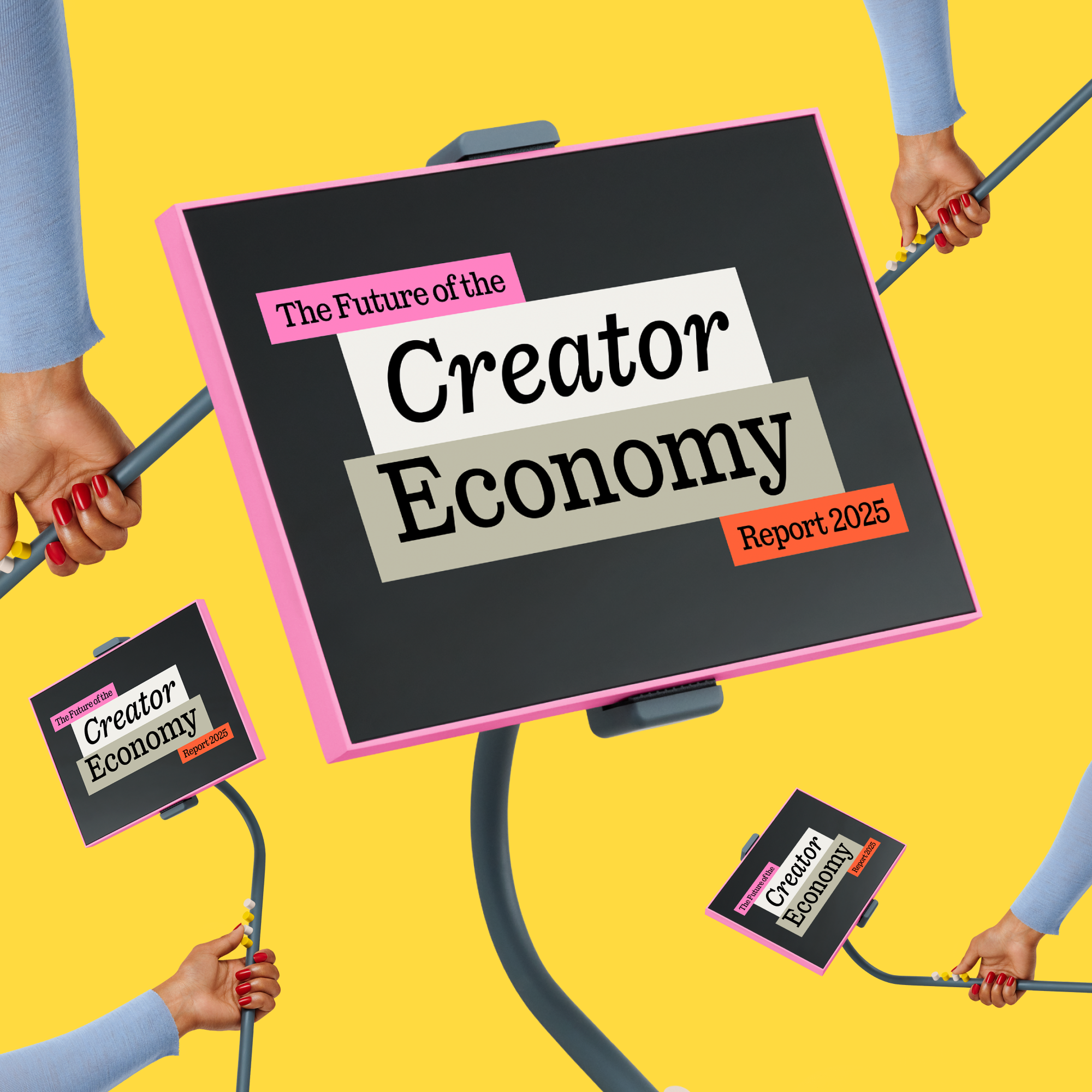- 94% of content creators say that music contributes to content's success – making it a core ingredient in brand building and driving engagement and discoverability.
- 95% of full-time and part-time creators are engaging fans through direct-to-fan models – moving from platform dependent to community owned.
- AI is becoming a creative co-pilot – 91% of content creators now use AI in their content creation process.
Stockholm, Sweden, June 17, 2025 – Content creators are evolving into brand-builders, technologists, and entrepreneurs. According to Epidemic Sound's The Future of the Creator Economy Report 2025, today’s creators* are further adopting tools like AI, diversifying their income, and leveraging music not as a backdrop but as a brand-building asset.
Now in its third year, the report captures insights from 3,000 professional creators across the US and UK, revealing how a new generation of creators is redefining success through technology, community, and creative control.
Music as a strategic asset
Today’s creators are making deliberate, brand-aligned music choices. Nearly all (98%) use music in their content, and 97% adapt their music strategy to match their creative goals. 94% say music contributes to their content’s success, particularly in strengthening brand relationships (61%), driving audience engagement (47%) and boosting discoverability (41%).
Music is also a top emotional driver: 27% prioritise emotional tone when selecting tracks. Creators are also adapting their music strategies to different formats. In short-form content, 27% say a strong hook is essential, while long-form demands consistency and flow (27%). Across both formats, emotionally rich music remains a constant priority (22% for short-form and 21% for long form).
Encouragingly, 93% of all creators feel either very or somewhat confident about music licensing, demonstrating a more sophisticated understanding of platform compliance and the importance of having the right license in place.
Platform expansion for strategic risk management
98% of full-time and part-time creators have creative or business goals for the next 12 months – and for many, that means expanding to new platforms. YouTube tops the list (45%) as it marks its 20th anniversary, with Instagram (41%) and TikTok (41%) close behind. But this isn't just about growth, it’s about resilience:
- 94% of creators are preparing for platform disruption
- 29% view platform diversification as a hedge against volatility
- 28% cite platform expansion as their top business goal
- 44% of US creators still plan to grow on TikTok, even amid uncertainty around its future
US creators are also eyeing next-gen platforms like Lemon8 (12%) and Rednote (8%), signaling an early-mover mindset and a strategic push to diversify. This ‘great platform shift’ is all about casting a wider net - reaching new audiences, experimenting with untapped formats, and reclaiming creative control.
The direct-to-fan revolution
The days of relying solely on ad revenue are over. 95% of full-time and part-time creators now use direct-to-fan models to generate income, through channels that reward loyalty, community, and control.
Key income streams and engagement methods include:
- 60% through marketing (ad revenue, brand partnerships and affiliate marketing)
- 58% through fan-driven purchases like merch, subscriptions, or online courses
- 37% are engaging fans through direct interactions (DMs, shout-outs, product sales)
- 35% are engaging fans via exclusive access to content or private communities
- 35% are engaging fans via artist and fan collaborations
This reflects a redefinition of the creator business model: from platform-dependent to community-owned. Income in general is now spread more evenly compared to 2024: live streaming (32%), ad revenue (29%), fan subscriptions (27%), platform creator funds (27%), and brand partnerships (27%).
Personal storytelling is also a standout strategy: 25% of creators use it to deepen fan connection, alongside exclusive communities and artist collaborations.
AI as a creative catalyst
AI is not just influencing content creation, it’s embedded in it. 91% of creators use AI tools in their content creation process, up 7% from the 2024 Future of the Creator Economy Report (84%), and 99% see value in AI tools for ideation, production, and innovation.
Key applications include:
- 72% use AI during content development (e.g., editing, storyboarding)
- 69% use AI for content generation (ideas, scripts, video, transcription)
- 43% use AI for music discovery or adaptation
Beyond ideation and editing, creators are integrating a growing suite of AI tools – from chatbots (30%), to adaptive music tools (28%) and auto-transcription (27%) – showing just how deeply AI is woven into their creative workflows.
Creative freedom doesn’t come easy. Time pressure (36%), burnout (35%), algorithm complexity and discoverability (34%) remain daily struggles – pushing creators to seek tools and models that restore balance and control. Which is why, rather than fearing displacement, creators are using AI to reclaim time and amplify creativity.
Looking ahead, 28% of creators expect the next 2-3 years to be shaped by AI-generated content, while 27% anticipate the rise of AI-powered creator marketplaces that auto-match them with brands, briefs, and licensing opportunities.
The Creator Economy, reimagined
Commenting on the report’s findings, Oscar Höglund, CEO and Co-Founder of Epidemic Sound, said: “The creator economy has come of age. Today’s creators are more ambitious, strategic, and empowered than ever before, leveraging everything from direct-to-fan monetisation to AI-powered production tools to build sustainable, audience-first businesses. Our latest report shows just how crucial music is in this landscape as a driving force behind engagement, discovery, and emotional connection. At Epidemic Sound, we’re proud to help creators soundtrack their success and navigate this evolving ecosystem with clarity, creativity, and control.”
With 61% of creators now working full-time and 19% of full-timers and 22% of part-timers planning to launch a business in the next 12 months, content creation is no longer a side hustle culture. It’s a thriving economic engine. And when asked how they define success, creators revealed values that go beyond virality: 25% said it’s financial stability and doing what they love, 22% prioritised creative freedom, and 20% pointed to cultivating loyal communities. Creators are building meaningful, values-driven businesses.
Epidemic Sound’s The Future of the Creator Economy Report 2025 underscores one clear truth: the future belongs to creators who take ownership – of their audience, their income, and their sound.
Methodology
The research was conducted by Censuswide, among a sample of 3000 Professional content creators aged 18+ across the UK and USA. The data was collected between 25.04.2025 - 02.05.2025. Censuswide abides by and employs members of the Market Research Society and follows the MRS code of conduct and ESOMAR principles. Censuswide is also a member of the British Polling Council.
Definitions: *Creators: All professional content creators surveyed.
Full-time creators: those for whom content creation is a profession.
Part-time creators: those who would refer to content creation as their side hustle.
In-house creators: those working as freelancers for, or are employed directly by, brands and agencies to create content.

